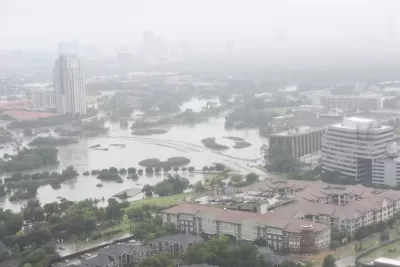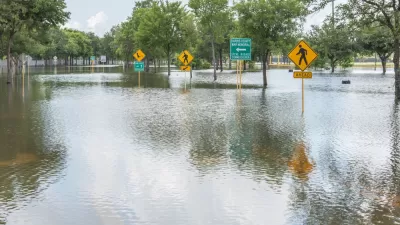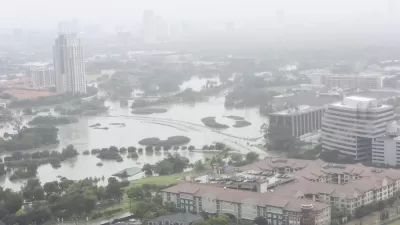As Houston's flood waters recede and attention turns from rescue to recovery and soon rebuilding, critics have pointed to the city's lack of zoning as the cause of the devastation. But are they looking in the right direction?

"As we watch Houston struggle with the catastrophic flooding associated with Hurricane Harvey’s biblical levels of rainfall, it is easy (from a safe distance, anyway) to get judgmental about the city’s famous lack of land-use planning," writes Ed Kilgore, political columnist for New York Magazine.
Houston legendarily has no zoning. The resulting haphazardness of its patterns of development, we may imagine, make the city a sitting duck for all sorts of disasters.
But doesn't a lack of zoning cause sprawl? If that was the only contributor, Planetizen's sprawl tag would only have articles pertaining to America's fourth largest city.
It’s true that Houston’s sprawl does invite problems, but it’s only partially true that the sprawl is a result of its lack of zoning...But the bigger problem is a lack of regional planning. Development has overwhelmed the city’s World War II–era reservoir system of flood control and consumed the wetlands that absorb excess rainwater.
Kilgore cites the now much-referenced ProPublica series, "Hell And High Water: Preparing Houston For The Next Big Storm."
"In Harris County alone, research by Texas A&M scientist John Jacob shows, almost 30 percent of freshwater wetlands were lost between 1992 and 2010, a figure he calls 'unconscionable,'" wrote three reporters: Neena Satija, The Texas Tribune and Reveal; Kiah Collier, The Texas Tribune; and Al Shaw, ProPublica.
Another insightful piece questioning the culpability of Houston's lack of zoning for the disaster was written by Henry Grabar, a staff writer for Slate’s "Moneybox."
The most important thing is this: No city is or should be designed to accommodate a one-in-a-million-year flood, which is what Harvey turned out to be.
For more discussion on whether zoning would have helped Houston whether the epic flooding caused by Hurricane Harvey, see blog post by Planetizen contributor Michael Lewyn.
FULL STORY: More Zoning Wouldn’t Have Protected Houston From Harvey’s Fury, But Less Sprawl Would Have Helped

Study: Maui’s Plan to Convert Vacation Rentals to Long-Term Housing Could Cause Nearly $1 Billion Economic Loss
The plan would reduce visitor accommodation by 25,% resulting in 1,900 jobs lost.

North Texas Transit Leaders Tout Benefits of TOD for Growing Region
At a summit focused on transit-oriented development, policymakers discussed how North Texas’ expanded light rail system can serve as a tool for economic growth.

Why Should We Subsidize Public Transportation?
Many public transit agencies face financial stress due to rising costs, declining fare revenue, and declining subsidies. Transit advocates must provide a strong business case for increasing public transit funding.

Columbia’s Revitalized ‘Loop’ Is a Hub for Local Entrepreneurs
A focus on small businesses is helping a commercial corridor in Columbia, Missouri thrive.

Invasive Insect Threatens Minnesota’s Ash Forests
The Emerald Ash Borer is a rapidly spreading invasive pest threatening Minnesota’s ash trees, and homeowners are encouraged to plant diverse replacement species, avoid moving ash firewood, and monitor for signs of infestation.

Agreement Keeps NYC Congestion Pricing Alive Through Summer
The tolling program will continue while a court considers the city’s lawsuit against the Trump administration.
Urban Design for Planners 1: Software Tools
This six-course series explores essential urban design concepts using open source software and equips planners with the tools they need to participate fully in the urban design process.
Planning for Universal Design
Learn the tools for implementing Universal Design in planning regulations.
Ascent Environmental
Borough of Carlisle
Institute for Housing and Urban Development Studies (IHS)
City of Grandview
Harvard GSD Executive Education
Toledo-Lucas County Plan Commissions
Salt Lake City
NYU Wagner Graduate School of Public Service





























